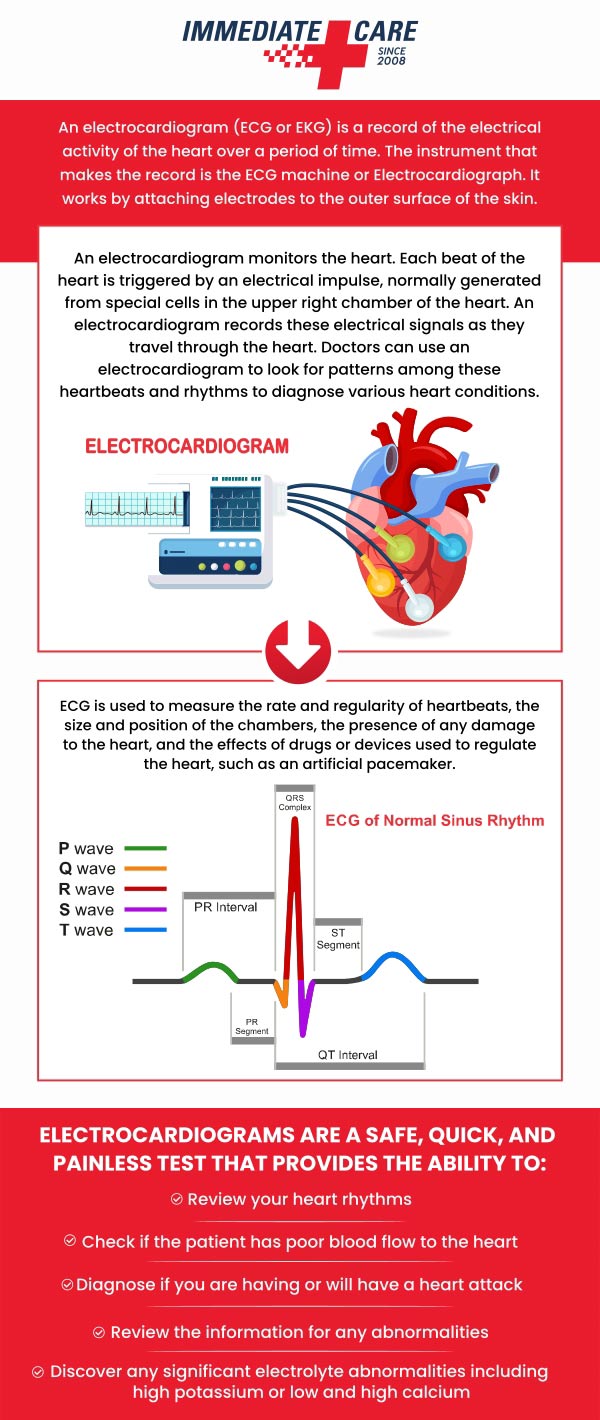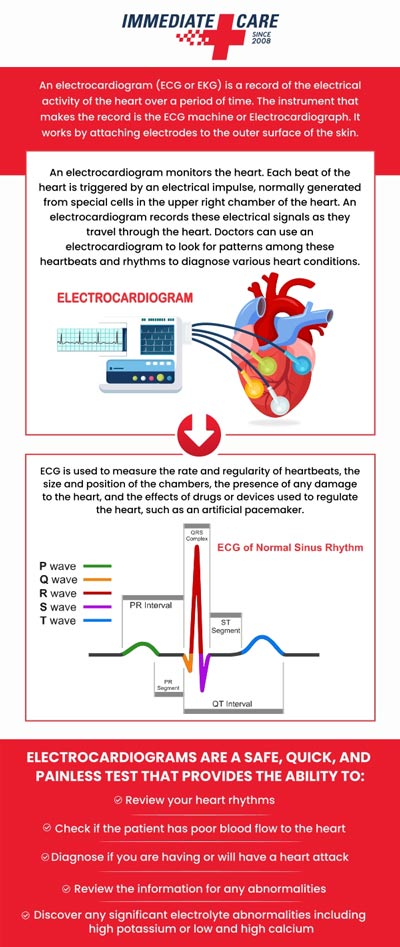How Long Does an EKG Take?
An electrocardiogram (ECG or EKG) is a test that measures the electrical signal from the heart to diagnose various cardiac problems. A normal EKG exam takes only a few minutes. Dr. Kevin Penwell (D.O.) and his team of medical experts at Immediate Care of Oklahoma provide a rapid and painless EKG test to examine your heart pattern and analyze how it functions. For more information, contact us or schedule an appointment online. We have convenient locations to serve in West Moore OK, Norman (HealthPlex) OK, Norman (24th) OK, Edmond OK, Yukon OK, I-240 & Sooner RD OK, Tecumseh OK, and Bethany OK.




Table of Contents:
What would an EKG say if you had a bad heart?
What abnormalities can be found on the echocardiogram?
Does your EKG change as you age?
How long does an EKG last for?
Electrocardiograms (EKG or ECG) are great non-invasive, completely painless diagnostic tests that are frequently used to measure the electrical activity of a patient’s heart, assisting physicians in identifying any potential heart conditions or abnormalities that require further testing.
EKGs are used to measure the electrical activity within the heart, showing any abnormalities of the rhythm that are indicative of potential heart problems. Not every single heart condition can be determined through an EKG alone, as they also only show the electrical activity during the time that it is connected to the patient, so if there are random inconsistencies or the heart problems only reveal themselves during specific activities or times of day, they may not be caught during the specific time that the EKG was taken. Additionally, if an EKG reveals an arrhythmia in the heart (an irregular heartbeat), this can’t conclusively determine that the patient has an unhealthy heart, it will simply indicate that more intensive diagnostic tests may be necessary. EKGs are often the first step for determining whether there is something of concern regarding the health of the patient’s heart.
An EKG can detect any changes in heart rhythm while the test is being performed, indicating the potential presence of several abnormalities or heart conditions depending on the provided results. The test can determine if the heart rhythm is faster or slower than what is considered to be normal or healthy if the heart is receiving sufficient levels of oxygen, or if there is a dysfunction in the electrical activity within the heart. More specifically, an EKG can indicate that the patient has a heart defect, heart valve disease, an enlarged heart, or coronary artery disease, and even if the patient has previously suffered a heart attack or if they are at risk of suffering from one in the near future. While the EKG is used to detect the presence of abnormalities in the heart, it is not able to provide conclusive diagnoses and is typically used to narrow down the types of tests that should be used moving forward.
Aging does affect the health and natural rhythm of our hearts, so an EKG taken of a young, healthy individual will look different when compared to that of an elderly, healthy individual even though they are both considered to be of good heart health. That being said, the risk of developing heart conditions or experiencing abnormal rhythms does increase with age, definitely not being the only factor that can cause changes in EKG readings. The EKG readings from young people to older people will look a bit different, with the amplitudes of the waves provided from the reading being a bit smaller with age, and with each wave being a bit longer apart. Abnormalities displayed by the EKG are more commonly seen in the older population even in those who are healthy, but other factors such as maintaining an unhealthy lifestyle, being obese, or suffering from other health conditions are more likely to result in significant changes in the EKG reading as the patient ages.
Since the results provided from an EKG will change a bit with age, you will likely need to get a new test completed if some time has passed since your previous test, particularly if you have a heart condition that continues to develop, a new EKG may be required even annually just to ensure that physicians are up to date with the condition of your heart. Even if your heart condition has not changed or worsened, your physician will want to ensure that all information they have regarding your heart health is up to date and accurate. Thankfully, if you go into the clinic to have the test completed, it will only take a few minutes, or you will be asked to wear a device that records the electrical activity of your heart over a longer period if relevant, and the test itself is entirely non-invasive.
When you experience unknown chest discomfort or other indications of cardiac conditions, our team of specialists at Immediate Care of Oklahoma provides on-site EKG examinations to promptly examine your cardiovascular health. For more information, contact us or schedule an appointment online. We have convenient locations near you in Oklahoma City, OK. We serve patients from West Moore OK, Norman (HealthPlex) OK, Norman (24th) OK, Edmond OK, Yukon OK, I-240 & Sooner RD OK, Tecumseh OK, and Bethany OK.


Additional Services You May Need
▸ Urgent Care Services
▸ Illness + Injuries
▸ On Site Lab + X-Ray
▸ Helpful Health
▸ Motor Vehicle Accidents
▸ Drug Testing
▸ MRO
▸ UTI Treatment
▸ Employment Physicals
▸ Workers Comp
▸ Strep Throat Treatment
▸ Pregnancy Testing
▸ Blood Pressure Testing
▸ Urinalysis
▸ Mononucleosis Treatment
▸ Suture Removal
▸ Respiratory Syncytial Virus
▸ OccMed








